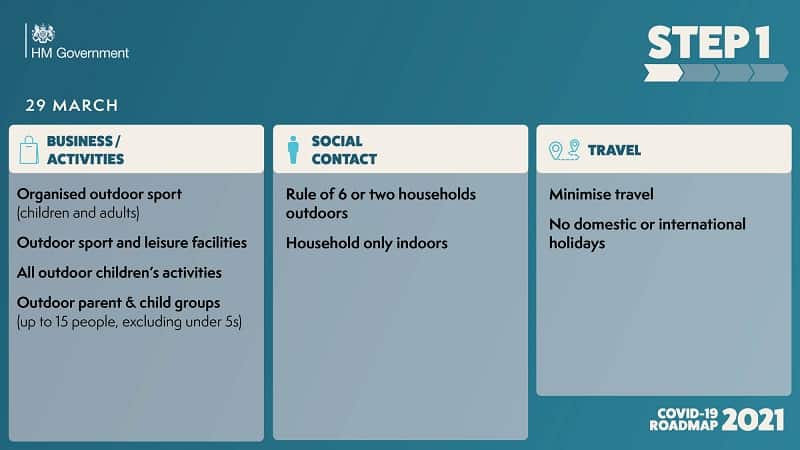
The government has today (March 22) set out regulations which will pave the way to the easing of all covid restrictions from June 21 but retain the Coronavirus Act until October so support for the most vulnerable, businesses and public services can continue.
The regulations set out today mean from March 29 outdoor gatherings of either 6 people or 2 households will be allowed again, including in private gardens.
A full review of the government roadmap out of restrictions will be conducted in advance of moving to step 2 from April 12.
The government has also published a review of the Coronavirus Act ahead of a vote in Parliament on March 25, which sets out measures which will be expired or suspended after Easter recess – such as the stay at home rule – as they are no longer essential to the national response to COVID-19.
If approved the regulations will replace the ‘all tiers’ rules which were made to enact the tier system at the end of last year.
The temporary measures within the Coronavirus Act require a renewal vote every 6 months. The Act enables the furlough scheme, virtual court hearings and the extension of Statutory Sick Pay to continue.
While the vote provides the legal basis for the act to remain in place for a further six months, until October, its provisions are reviewed in a report every 2 months. The roadmap regulations must also undergo statutory review every 35 days.
The Act ensured the NHS had the capacity to deal with the peak of the virus by allowing the temporary registration of nurses and other healthcare professionals. It provided courts with the ability to use video technology and it allowed the government to put in place support packages such as the Coronavirus Job Retention Scheme and Self-Employed Income Support Scheme. It has also enabled businesses to access loan schemes.
Health Secretary Matt Hancock said: “We are today setting out the legal foundations which, if agreed by Parliament, will deliver the roadmap out of lockdown.
“These measures have been vital to reducing infections, hospital admissions and deaths across the country, and thanks to people’s commitment and support, we have made strong progress.
“We are rightly ending as many national measures as safely as possible, while maintaining those which remain necessary and proportionate to help reduce and control infections further as we cautiously but irreversibly ease restrictions and our historic vaccination programme continues apace.”
Decisions on easing restrictions will be led by data not dates, and subjected to four tests.
- First, that the vaccine deployment programme continues successfully;
- Second, that evidence shows vaccines are sufficiently effective in reducing hospitalisations and deaths;
- Third, that infection rates do not risk a surge in hospitalisations which would put unsustainable pressure on the NHS;
- Fourth, that our assessment of the risks is not fundamentally changed by new variants of Covid that cause concern.
There will be five weeks between each step with one week’s notice of confirmed changes.
The remaining steps are (all dates are the earliest date possible):
March 29

The return of the rule of six for outdoor meetings – including private gardens -and allowing two households to meet outdoors
Outdoor sport courts for tennis, basketball etc and outdoor swimming pools to reopen as well as organised outdoor sports.
Removal of the legal requirement to stay at home although people will be asked to work from home if they can and to minimise travel.
Step 2 April 12

Non essential retail reopens.
Personal care services, including hairdressers, can resume business
Indoor gyms reopen
Holiday lets/ self-contained accommodation – those that do not require shared use of bathing, entry/exit, catering
or sleeping facilities – can also reopen, though must only be used by members of the same household
Outdoor service at pubs and restaurants reopen – no curfews or requirement for a substantial meal with alcohol but rule of six/household groups applies
Zoos, theme parks, drive in cinemas, libraries and community centres can reopen
Funerals continue with up to 30 people,
Wedding receptions and wakes to have a limit of 15 people.
Step 3 May 17

Restrictions on meeting outdoors lifted with up to 30 people allowed to gather
Visits to friends and families indoors allowed with the rule of six or two households
Reopening of indoor pubs, restaurants, play areas, cinemas, theatres, hotels, B&Bs and sport stadiums. Rule of six will apply for seating in pubs/restaurants etc.
Indoor performance and sport venues with capacity to 1,000 or half full. Outdoor venues capacity 4,000 or half full – whichever is lowest.
International travel resumes subject to review
Step 4 June 21

Reopen everything including nightclubs and large events. End of legal limits on social contact “with appropriate mitigations.” Large scale events resume, restrictions lifted from life events such as weddings.
The reviews
First review will be into social distancing and face coverings
Second review into the resumption of international travel. A successor to the Global Travel Taskforce will report by 12 April so that people can plan for the summer.
Third review into covid status certification for venues
Fourth review into the safe return of major events

